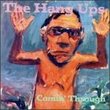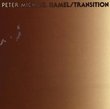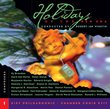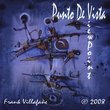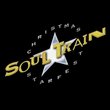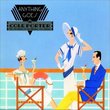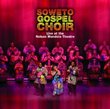| All Artists: Michael Hoenig Title: Departure From the Northern Wasteland Members Wishing: 1 Total Copies: 0 Label: Kuckuck Schallplatten Release Date: 1/23/1992 Genres: Dance & Electronic, Jazz, New Age, Pop, Rock Styles: Techno, Meditation, Progressive, Electronic Number of Discs: 1 SwapaCD Credits: 1 UPC: 013711107920 |
Search - Michael Hoenig :: Departure From the Northern Wasteland
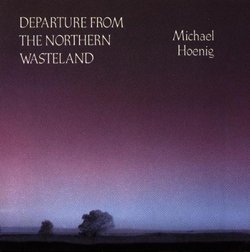 | Michael Hoenig Departure From the Northern Wasteland Genres: Dance & Electronic, Jazz, New Age, Pop, Rock
Departure from the Northern Wasteland was first released in 1977. It represents Michael Hoenig's return to a more compositional approach to music after working solely with improvisational music for five years. Each piec... more » |
Larger Image |
CD DetailsSynopsis
Album Description Departure from the Northern Wasteland was first released in 1977. It represents Michael Hoenig's return to a more compositional approach to music after working solely with improvisational music for five years. Each piece is developed largely from a mood, and though the music begins here, it is music that is finished in the mind of each listener. On this album, Hoenig works with the compositional concepts of a single tonal center and a basic rhythmic pulse. The rhythmic element is very important to him and he utilizes various pulse units as well as drifting downbeats. Musically complex and an electronic classic, this CD consistently provides the listener with new experiences each time it is heard. Similar CDs
Similarly Requested CDs |
Member CD ReviewsReviewed on 5/25/2010... ex-Agitation Free/Tangerine Dream member first solo LP from 1978, one of those LPs that straddles the line between new age and Krautrock-should please fans of both. 2 of 2 member(s) found this review helpful.
CD ReviewsPossibly the pentacle of "Berlin School" electronic music Micah R. Sisk | Frederick, MD USA | 04/11/2001 (5 out of 5 stars) "Though comparisons with Tangerine Dream's work of the mid to late 1970's are inevitable when approaching this recording, Michael Hoenig's Departure from the Northern Wasteland in many respects represents the absolute pentacle of the electronic music scene then flourishing in Germany. Released in 1977, "Departure" took the burbling, sequence-driven, analog soundscapes of Tangerine Dream to new heights, introducing a fresh sense of purpose and a tighter rhythmic/compositional control to what was by then well trodden territory.It is possible that this compositional control was helped along by newly available digital sequencing technology which made possible the storage and instant retrieval of musical phrases. (I'm not sure when Hoenig gained access to this equipment, I can find no list of equipment used on this release. However, the Oberheim DS-2 sequencer was available in 1975 and was used by the likes of Synergy, aka Larry Fast.) Whatever the case, digital sequencing was soon to play a major role in changing the electronic music scene forever. As with most technological advances, this change brought both boon and bane. Freed from the limits of sequencers offering no more than 8 to 32 notes, composers of sequence-driven music could now create musical phrases of seemingly endless length, simultaneously allowing them to make quick compositional shifts heretofore unthinkable. No longer were composers burdened with having to manually change every note by knob or slider, a physical limitation which had led to the lengthy, static compositions and repetitive bass percolation so typical of this music. Yet it was just that, the cumbersome user interface of analog sequencers, which had helped define the style. When the interface changed, so did the music.Other phenomenon conspired to relegate so-called "Berlin School" electronic music to a sub-underground status (Yamaha's FM synthesis technology and the rise of "New Age" music being two). But one cannot help mark that Hoenig's Departure from the Northern Wasteland, poised as it was on the very edge of analog's near extinction, remained more faithful to its stylistic predecessors than did Tangerine Dream's release, two years later, of Force Majeure.Hoenig published no other solo works in the 1970's, which is a shame, for I hold this work to be one of my prized possessions. It is a must-have for anyone interested in pre-dance electronica and offers a different look at something familiar, while turning some very new pages. If you're into this, also check out New Age of Earth by Ash Ra Temple." Necessary For Any Tangerine Dream Fan Paul Allaer | Cincinnati | 07/08/2002 (5 out of 5 stars) "Even though Michael Hoenig was only briefly a member of Tangerine Dream (and they never recorded a studio album with him), this album is an absolute necessary addition to the Tangerine Dream catalogue.Released in 1977, this album is completely in line with TD releases like "Ricochet" and "Encore". The sequencers are all over this album, and create a throbbing atmosphere. The key track is the opener title track, a 20 min. journey that ranks among the top Tangerine Dream output of the 1975-1978 era.For those looking to nowadays Tangerine Dream-like sounds, check out Spacecraft, which has issued some great albums in the late 90s like "Hummel" (see my review there)."
|

 Track Listings (4) - Disc #1
Track Listings (4) - Disc #1